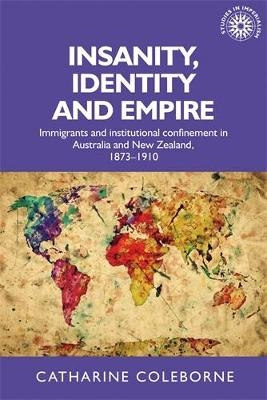
Insanity, Identity and Empire
Immigrants and Institutional Confinement in Australia and New Zealand, 1873–1910
Seiten
2015
Manchester University Press (Verlag)
978-0-7190-8724-0 (ISBN)
Manchester University Press (Verlag)
978-0-7190-8724-0 (ISBN)
Based on over 3000 institutional records, Coleborne's study will have wider relevance outside of the history of medicine and psychiatry. It has a global perspective but focuses on specific destinations, and in so doing, contributes in an innovative way to global history and the history of human migration. -- .
This book examines the formation of colonial social identities inside the institutions for the insane in Australia and New Zealand. Taking a large sample of patient records, it pays particular attention to gender, ethnicity and class as categories of analysis, reminding us of the varied journeys of immigrants to the colonies and of how and where they stopped, for different reasons, inside the social institutions of the period. It is about their stories of mobility, how these were told and produced inside institutions for the insane, and how, in the telling, colonial identities were asserted and formed. Having engaged with the structural imperatives of empire and with the varied imperial meanings of gender, sexuality and medicine, historians have considered the movements of travellers, migrants, military bodies and medical personnel, and ‘transnational lives’. This book examines an empire-wide discourse of ‘madness’ as part of this inquiry. -- .
This book examines the formation of colonial social identities inside the institutions for the insane in Australia and New Zealand. Taking a large sample of patient records, it pays particular attention to gender, ethnicity and class as categories of analysis, reminding us of the varied journeys of immigrants to the colonies and of how and where they stopped, for different reasons, inside the social institutions of the period. It is about their stories of mobility, how these were told and produced inside institutions for the insane, and how, in the telling, colonial identities were asserted and formed. Having engaged with the structural imperatives of empire and with the varied imperial meanings of gender, sexuality and medicine, historians have considered the movements of travellers, migrants, military bodies and medical personnel, and ‘transnational lives’. This book examines an empire-wide discourse of ‘madness’ as part of this inquiry. -- .
Catharine Coleborne is Professor of History in the School of Social Sciences at the University of Waikato, New Zealand -- .
Introduction: Insanity, identity and empire
1. Insanity in the ‘age of mobility’: Melbourne and Auckland, 1850s–80s
2. Immigrants, mental health and social institutions: Melbourne and Auckland, 1850s–90s
3. Passing through: narrating patient identities in the colonial hospitals for the insane, 1873–1910
4. White men and weak masculinity: men in the public asylums, 1860s–1900s
5. Insanity and white femininity: women in the public asylums, 1860s–1900s
6. The ‘Others’: inscribing difference in colonial institutional settings
Conclusion
Bibliography
Index -- .
| Reihe/Serie | Studies in Imperialism |
|---|---|
| Zusatzinfo | 1 Maps |
| Verlagsort | Manchester |
| Sprache | englisch |
| Maße | 156 x 234 mm |
| Gewicht | 549 g |
| Themenwelt | Geisteswissenschaften ► Geschichte ► Regional- / Ländergeschichte |
| Geschichte ► Teilgebiete der Geschichte ► Wirtschaftsgeschichte | |
| Studium ► Querschnittsbereiche ► Geschichte / Ethik der Medizin | |
| Sozialwissenschaften ► Pädagogik ► Sozialpädagogik | |
| Sozialwissenschaften ► Soziologie ► Makrosoziologie | |
| ISBN-10 | 0-7190-8724-4 / 0719087244 |
| ISBN-13 | 978-0-7190-8724-0 / 9780719087240 |
| Zustand | Neuware |
| Informationen gemäß Produktsicherheitsverordnung (GPSR) | |
| Haben Sie eine Frage zum Produkt? |
Mehr entdecken
aus dem Bereich
aus dem Bereich
Macht und Herrschaft im Zarenreich
Buch | Hardcover (2024)
C.H.Beck (Verlag)
CHF 69,85
wie die USA und China um die technologische Vorherrschaft auf der …
Buch | Hardcover (2023)
Rowohlt (Verlag)
CHF 41,95


